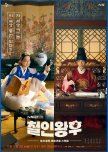
This review may contain spoilers
Does the body rule the mind or does the mind rule the body?
The Game of Thrones comparisons amuse me as a huge ASOIAFhead.Frankly, I only prioritized watching Mr. Queen so soon after finding it (had a long drama hiatus) cause I wanted to see how far the gayness would go. For the first 12ish episodes I generally found the humour tiresome and the politics boring. By ep 13 something clicked and I was suddenly invested in the whole thing. I stayed engrossed until, surprise surprise, the infamous finale.
Before I get into that, Shin Hye-sun deserves all the praise she's gotten. She IS the show and gave it its... soul. The occasional comedic moments that worked for me were always due to her, and the range she displayed as this hybrid character was Mr. Queen's success.
Everyone's already complained about the ending, okay, yeah. Still, I have a few things to say.
No matter how you cut it, I don't see how the ending could be viewed as anything other than a failure. I never expected Bong-hwan to remain inside So-yong's body, as much as I would've enjoyed that as an actual subversion of typical body-swap stories. How that would've worked, I'm not sure. Something to do with them having the same soul? The initial body-swapping was already done on flimsy enough grounds—there was no precise Freaky Friday-esque lesson to be learned. Regardless, it's pretty much expected that he'll come home to our modern era by the end, so while not preferable to some (me!), it's understandable. I also don't think there's anything wrong with So-yong reaping the political benefits of Bong-hwan's actions in and of itself, yet it is a bit boring. As a victim of court life, it's obvious the writers were going to compensate her. The compensation is fine, but as a tragic figure and little else, it's rather banal. As others have asked, why should we care? Everything Bong-hwan achieved was essentially for So-yong's sake, regardless of his intentions, including capturing Cheoljong's heart. This would've worked better if it had been done ironically and with a sense of humour—Cheoljong does fall in love with So-yong's body... which houses someone else. Instead, we're supposed to be pleased by the unadventurous angle imposed by this need for reparation. But it brings into question how much was So-yong and how much was Bong-hwan...
You can't actually identify what's exactly going on with So-yong/Bong-hwan, so there's almost no debate to be had. Ultimately what matters is what's narratively interesting and satisfying. Bong-hwan's "My feelings for the king, a man, are due to the queen's lingering essence and hormones blah blah" explanation was so silly I didn't mind it. The show kind of takes it seriously, but it's just funny. Beyond the relationship, was his survival instinct purely that, an innocent, selfish intuition, or were his efforts partly driven out of compassion for the queen? Yes, it's basically confirmed by his explicit late-stage denial of having any charitable feelings, which has proven to be untrue. But then how much of this compassion is the queen's unintended influence? What about Byeong-in's assertion that Bong-hwan's So-yong is not So-yong? She's kind of there, but really isn't. The muddle's good enough because it's thorny and, therefore, interesting, albeit too convenient. The problem is it just doesn't go anywhere interesting, or rather, the show's incompetent imagination snuffed out any possibilities for satisfying closure to this muddle. It's indicative of the show's overall inability to integrate story with the bare-bones formula, as Park Min wrote in their review, though the ending still could've rung truer than it does, I think.
The glaring issue is that no time is given to Bong-hwan once he's back in his body. There's no time for him to gain his bearings and observe the potential consequences of his choices in a slightly altered Korea, let alone reflect on his feelings and selfhood and what he wants in the future. We can presume he's a more caring person now and nothing else. We don't even see him faffing around after he confirms Cheoljong's victory; we don't see him do anything. Bong-hwan as So-yong consistently talked to himself to work things out, but I guess he doesn't need that now that everything's normal. The cutesy moments between Cheoljong and So-yong felt surreal and hollow. Who cares if Cheoljong notices a difference, the viewer does. Quite simply, it's too easy. It's not as tragic or bittersweet or triumphant as it could be, and the middle ground is aggravating. The momentum built is dampened to nothing. If it had all been played for laughs then none of this would matter, but it's this halfway point between comedy and sincerity, and the sincere note it ends on seems phoney and unearned. Even if you're fine with where the characters end up, I don't see how you'd get a real sense of fulfillment from that final episode.
I'm being critical because Mr. Queen is a popular show, and while Bong-hwan's character typically felt alive and emotionally honest (one of the best compliments I could give), everything else was relatively uninspired, and that eventually tainted him. I'm not asking for the show to do anything revolutionary, and it obviously worked for many, many people. My issue is that it almost really worked for me—it's been days and I'm still thinking about Bong-hwan and Cheoljong's relationship and its implications—as messy as it all was. I guess if you're looking for a chaotic mix of gender, love, and political elements, the back-to-back Cersei/Jaime/Brienne AFFC chapters hit a little harder.
I liked it though, and as punishment, I'm in a drama slump.
Was this review helpful to you?

Love to have Minor Misgivings about You
This review applies to Crazy Love as well—tenfold! I should've written something after watching it; I felt a lot more passionate about its failings than I do with Love to Hate You.Anyway, little tension or passion, no interesting relationship development. It's comical how little Kang-ho's supposed dislike of women and Mi-ran's scepticism towards men actually factored into said development, useful solely as an annoying gimmick. Specifically with the ML, his generalizations are played too straight and never genuinely contested, so they're neither irrational and silly enough to ignore, nor do they mean anything, The explanation as to why he has issues with women is too puerile when the entire purpose of his, uh, bias?, is to contrast the FL. Maybe he should've been red-pilled. At least it shouldn't be advertised as serious enemies-to-lovers. I've noticed newer dramas struggle to establish semi-antagonistic relationships with any weight. This has more to do with chemistry and audacity than depth. Since there's no proper romance/sex comedy push-and-pull (Pillow Talk (1959) is a fun, good example) the show's identity and tone feel annoying and artificial. Where's the purported self-awareness?
Though the second half is better, the conflict surrounding the central relationship was surprisingly trite and weakened everything somewhat interesting about it. I want this to remain spoiler-free, so I'm being vague. The ML and FL dealt with external pressure in a very corny way, and I have a hard time reconciling this writing decision with their initial behaviour. It's just so unserious. Everything felt as flat and forced as can be. Side characters did nothing but exacerbate this. Kim Ok-bin has a likability to her at least, which seems to be an unpopular opinion. I'll take her over Teo Yoo's character any day. Most of the negative reviews are incredibly prudish, bitching about the FL's sluttiness. That beginning part where she's sleeping around might've been the only bit I enjoyed, as it was topical and promised a zing that immediately disappeared.
Yet another review of mine about how a show isn't too painful to sit through, just unsatisfying in its unadventurous approach to a unique enough premise. Of course, all Love to Hate You needed to do well was the romance. I had many problems with Crash Course in Romance, but the romance worked for me and Jung Kyung-ho is great, so I didn't write a fussy review.
And I hated the music.
Was this review helpful to you?

This review may contain spoilers
Big day for Fragrantica users
I kind of hated this show at first, and it somehow managed to win me over enough that I put off watching anything else. Maybe it's because I'm attracted to Shin Sung-rok, maybe it's because it became a bit less dumb, or maybe it's because I got accustomed to its wavelength. Don't get me wrong, half of the comedy never worked for me (it usually doesn't with rom-coms, alas I continue...), but half of it did. I was surprisingly amused. The horror music that played whenever the change happened felt stupid and became repetitive only the second time it happened. I have a thing for neurotic men à la Niles from Frasier, so you can imagine I was pleased by Yi-do, who was too much of a diva to take seriously.I'm writing this a week after I finished, and I'm almost wondering if I'm misremembering something, but onto my main issue:
It can't successfully convey its obvious, though not unnecessary, message when the older, overweight, REAL version of Min Jae-hee doesn't even get the bare minimum in a relationship - a kiss. At a certain point during the final episodes you're waiting for Min Ye-rin to go away. While that wouldn't work with how they developed her modelling career storyline (so the essential plot), Ha Jae-sook's Jae-hee is shelved from having any meaningful or fun(!) scenes with Yi-do, just convos regarding her insecurities and mortality. Her insecurities are valid as a plot point up until a point. The problem is that they're only surmounted off-screen and that the most we get as a climax is an engagement we already know Yi-do wanted; there's nothing satisfying or, more importantly, very romantic about it without a proper consummation. The romance overall was relatively chaste, but the lack of one single kiss is pretty ridiculous when the characters are around 40, and young, skinny Jae-hee got her moments. Really, all it does is undermine its message. I don't watch K-dramas for anything more than fluffy entertainment, but when a show's crucial theme is so plainly weakened by its lack of edge, it has to be acknowledged.
I also think the first love nonsense worsened the romance. Initially, I was unsure how Yi-do—a fatphobic fashion designer—would come to accept Jae-hee. While I'm not totally against the first love concept as a way of facilitating this acceptance, I felt like Yi-do's character, namely his eccentricities, was whitewashed. The character/tonal switch-up from when he was high-strung and everything was comedic, to the saccharine, overly agreeable man he became didn't fully work. Their relationship had little play or variation to break up the monotonous affability he fell into. This + the lack of, I suppose, skinship, is why I couldn't shake the feeling that he loved her just because he had to, and that there is indeed a difference between Ye-rin and Jae-hee.
Despite all this, I enjoyed myself enough to finish (more like binge) and would recommend it with a few caveats. I don't think the show is as bad as others seem to believe, though I sure don't think it did much particularly right either. I agree with ArvisJaggamar in that there's some mental dissonance in its avoidance of the essential topics that are naturally introduced by the story. Ultimately though, I just want to see Shin Sung-rok in more rom-coms.
Was this review helpful to you?


